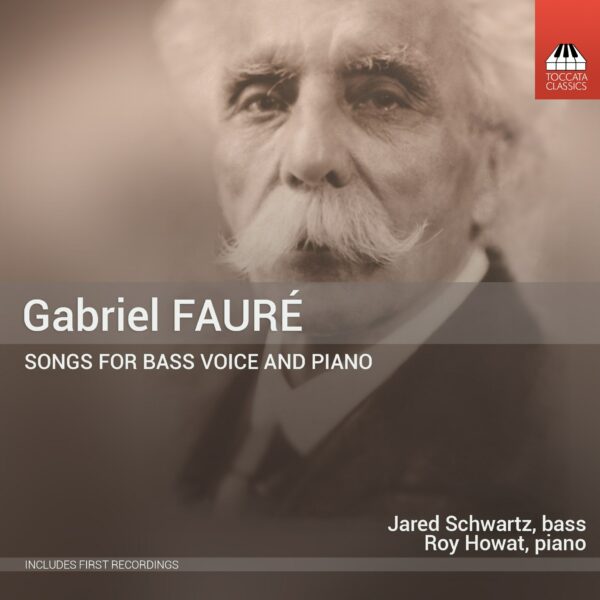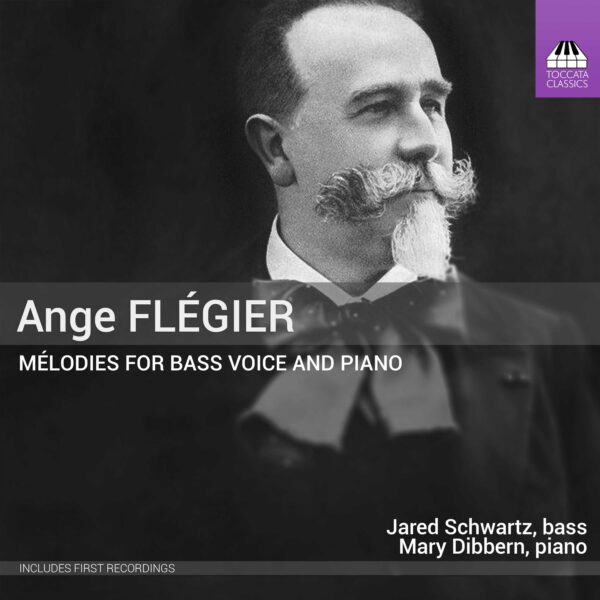Gabriel Fauré: Songs for Bass Voice and Piano
This collection of Fauré’s mélodies – the first recording to be conceived for a bass voice – juxtaposes some of the composer’s best-loved songs with some of his lesser-known works. Going beyond the often arbitrary ordering of early editions, this programme draws out connections of poets and poetic themes, some of which restore the composer’s own original groupings. This is the first recording to be based on the new Peters Edition, which eliminates countless errors in older publications.
Jared Schwartz, bass; Roy Howat, piano;
Listen To This Recording:
- Hymne
- La rançon
- Chant d’automne
- Tristesse
- L’absent
- Le parfum impérissable, Op. 76, No. 1
- Sérénade toscane
- Après un rêve
- Les matelots
- La chanson du pêcheur (Lamento)
- Mandoline, Op. 58, No. 1
- En sourdine, Op. 58, No. 2
- Prison, Op. 68, No. 1
- Dans la forêt de septembre, Op. 85, No. 1
- Tristesse d’Olympio
- Aurore, Op. 39, No. 1
- La fleur qui va sur l’eau, Op. 85, No. 2
- Fleur jetée, Op. 39, No. 2
- Le don silencieux, Op. 92
- Nocturne, Op. 43, No. 2
- Les présents, Op. 46, No. 1
- Au bord de l’eau
- Ici-bas
- Barcarolle
- Le Voyageur, Op. 18, No. 2




MusicWeb International :
‘… accompanist Roy Howat is a specialist in French music and studied in Paris with Vlado Perlemuter, who worked with Fauré. The prerequisites for an idiomatic recording of the piano parts for these Fauré songs is thus well catered for. …
Jared Schwartz, who is a true bass, is in many ways an expressive singer, and in the middle and upper part of his register he is sensitive and nuanced. … It is also gratifying to have the complete texts with English translations. …
To sum up: largely well considered readings’
—Göran Forsling, MusicWeb International
Fanfare Magazine :
‘There are a total of 25 songs on this disc and each of them has been recorded with care and affection for the music of this wonderful French songwriter of the late 19th and early 20th centuries. … Schwartz’s excellent new recording on Toccata gives us pristine sound and offers flac downloads as well as CDs. This is a recording that should be in the collection of everyone who loves French song.’
—Maria Nockin, Fanfare Magazine Magazine, March/April 2016
American Record Guide :
‘Schwartz, a young and multitalented musician, has a lyrical basso cantabile voice. He employs fine vocal coloring and has enough agility to make a good case for a bass voice in these songs. He sings with gentleness and lyricism. His voice is very good when singing quietly; … Howat offers skillful accompaniment. In his clear and informative notes Howat gives an account of the extensive research that has resulted in “correcting literally hundreds of errors in the old prints and offering many optional variants from manuscripts and original editions”. One achievement of the project is restoring Fauré’s first setting of the Tuscan poem ‘Levati Sol’ (later translated into French as ‘Apres une Reve’), which Fauré had initially paired with another Tuscan poem, ‘Serenade Toscane’. The two are recorded here for the first time in their resurrected Tuscan settings.’
—Robert A Moore, American Record Guide, January 2016
NATS Journal :
‘There is far more to Schwartz’s singing than mere lovely sound. He is also unafraid of engaging with these songs in the most expressive manner possible. One of the most impressive examples of that is in “Tristesse,” which features a text by Théophile Gautier. … There is a highly charged theatricality to Schwartz’s singing here that calls to mind some of the finest performances of Edith Piaf and other highly expressive singers of her ilk. Te approach feels poles apart from the balanced nuance of more typical art song performances, but the effect is electrifying. His command of French diction is impeccable and he breathes expressive life into all of these texts. Moreover, he manages to negotiate even the most intricate melodic flourishes with a grace that one does not always associate with lower, burlier voices. Fauré’s piano accompaniments are thought to be somewhat simpler than those found in the mélodies of Debussy and other impressionists, but they are ofen much more challenging than they appear to be. Roy Howat has the technical mastery to mask those difculties as he surmounts them, and it is that astonishing sense of effortlessness with which he plays that allows him to so richly enhance the beauty of these songs. Moreover, he and Schwartz achieve flawless synchronicity in even the most complex of these songs, which is no small feat when the rhythmic palette is so varied and fluid. … This array of songs offers up an engrossing celebration of all that made Fauré such an important and effective composer of songs, from the delicate and familiar loveliness of “Ici-bas” to the unsettling darkness of an obscure gem like “La rançon.” … This recording serves a very important purpose by awakening in us a deeper appreciation for all that Fauré accomplished in his songs. Moreover, it also helps to expand our notion of what kind of voices can successfully traverse these pieces.’
—Gregory Berg, NATS Journal, March/April 2016
Theater Jones :
‘…Fauré’s songs are generally not entrusted to basses. That’s a foregone conclusion that Mr. Schwartz has heard before, though. He even gives us an essay in the disc’s accompanying booklet defending the decision to perform them. And as Schwartz and Howat demonstrate, the best defense is a good performance, even if it risks offending an occasional sensibility. … Sung by a bass, these songs achieve levels of poignancy (as in “L’absent”), irony (“Mandoline”), and darkness (“Prison”) that they may have sacrificed to the familiarity that higher registers have afforded them. So it seems to me that a bass is the very thing that Fauré’s mélodies need.”
—Andrew Anderson, –Theater Jones, March 2017
Gramophone :
‘This is a recording unique unto itself, so comparisons with the dozens of other interpretations of Fauré’s songs already available would not be especially instructive. The factor that puts the disc in a special category is that the American singer Jared Schwartz is a bass, albeit a bass with an outstanding flexibility and range. […]
But there is an added rarity in the fact that Schwartz sings two items in the original Tuscan rather than the customary French. The fact that these include probably Fauré’s most famous song, ‘Après un rêve’ – or ‘Levati, sol’ – might raise the odd eyebrow, but Schwartz, as throughout this programme, has a feeling for colour and mood. From his diction you can tell that he is not French, nor indeed Tuscan, but he compensates with mellifluous lines and a malleability of timbre. All the songs suit his musicality well, and some – such as the angry ‘Fleur jetée’ and the introspective ‘L’absent’ – seem positively to gain from Schwartz’s intensity. Roy Howat, on whose new edition of Fauré’s songs this selection is based, is a stylistically perceptive, sensitive accompanist.’
—Geoffrey Norris, Gramophone
AllMusic :
‘All are taken from the Edition Peters collection, edited by Howat, and the corrected versions will be of great interest to Fauré scholars and singers. But listeners will be most fascinated by the charming interpretations Schwartz brings to these settings of Baudelaire, Gautier, Verlaine, and other French poets, because his rich voice is flexible enough in the baritone register to bring out the songs’ elegance and sweetness, while his lower tones are dark and seductive. Howat’s restrained playing suits the subtlety of the music, […] this is a worthwhile recording for Fauré fans to hear and own.’
—Blair Sanderson, AllMusic